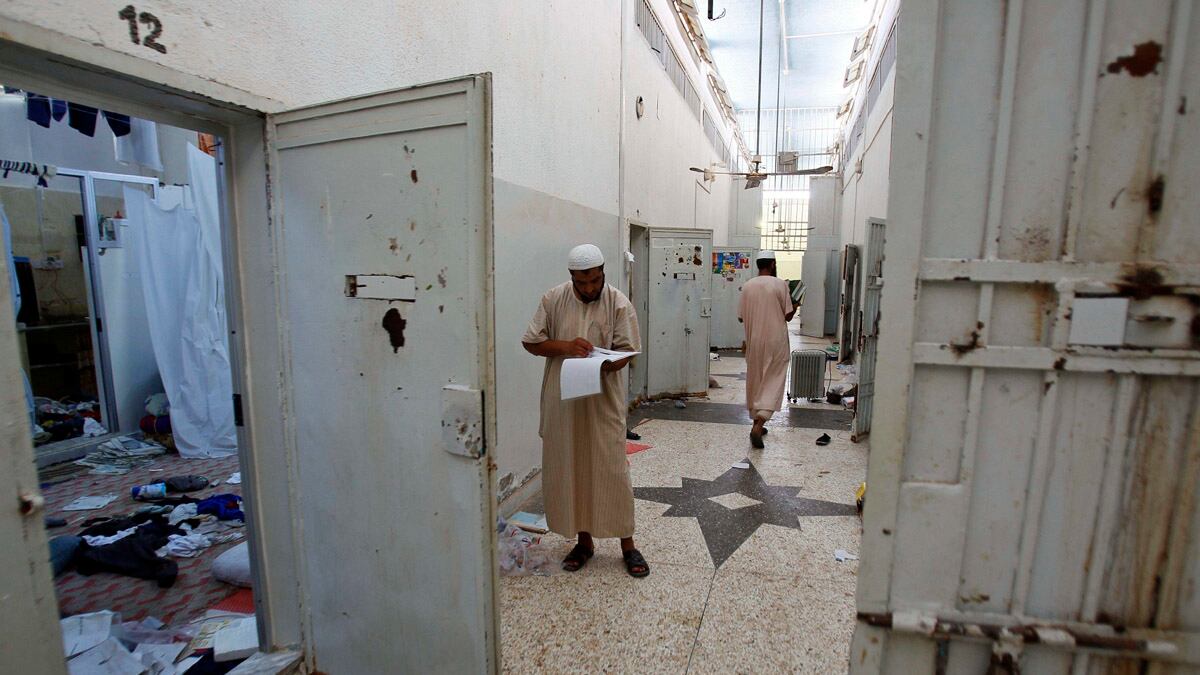It started with a loud boom. Saad Al Shahoubi stirred in his cell in the infamous Abu Salim prison in Tripoli, trying to figure out what was going on. Minutes later a group of men came into the prison and began breaking locks off cell doors. After spending 14 years inside, Shahoubi, 40, wasn’t about to take the bait. “I was afraid,” he says. “I thought it was a trick.” But this wasn’t another sadistic game set up by Muammar Gaddafi’s torturers. Libya’s rebels hit the prison gate on Wednesday amid a fierce battle for control of the area. And people from the surrounding neighborhood had come in to break the prisoners out and give them shelter. “It was one of the happiest days of my life,” Shahoubi says.
The surprises didn’t stop there. As Shahoubi was getting out of prison, his twin brother, Mehdi, was on his way to Tripoli from Benghazi, in eastern Libya, to look for him. Mehdi, who has the same light-green eyes as his brother, knew the horrors of the Abu Salim prison all too well: he spent five years in the prison with Saad from 1997 to 2001. On Thursday the two brothers were reunited at a rebel military base in Tripoli. “It was a great joy,” says Mehdi with a broad smile.
It’s hard to downplay the significance of the Abu Salim prison in Libya’s recent history. Gaddafi used the place as a torture chamber and charnel house where thousands of political prisoners disappeared, leaving behind broken families and lives. “This place was a hellhole,” says Akram Mohamed Ramadan, a rebel fighter who came to visit the prison on Friday. “When someone goes in, they never come out. This is the most evil place in all of Libya after Bab al-Aziziya [Gaddafi’s residence].”
Among ordinary Libyans, the prison is best known for a 1996 massacre where more than 1,200 prisoners were killed, perhaps Gaddafi’s most atrocious act. The origins of the Libyan uprising this year are directly tied to it. On Feb. 15, a young lawyer who was representing the families of hundreds of men killed in that massacre, Fathi Terbil, was arrested in the eastern city of Benghazi. Small protests broke out in the city the same day over the arrest, and much larger crowds hit the streets two days later, on Feb. 17, noted among the opposition as the first day of the uprising.
Ali Matouq, a 41-year-old businessman, witnessed the killings at the prison in 1996. He came back to Abu Salim on Friday, like the Shahoubi brothers, to explore a dark part of his past. “I felt something was pushing me to come back,” Matouq says, taking a deep breath. “To feel free from the prison.” On the night of the massacre, dozens of prisoners were ordered out of their cells. “I thought I would die,” he says. Instead the guards turned their guns on the hundreds of prisoners who were kept in their cells. Matouq says he was probably spared because his 10-year prison sentence was almost finished. On Friday he walked to a large site, roughly 30 yards long and 20 yards wide, in one corner of the prison, to point out where the hundreds of prisoners were buried. The ground is covered with sand and small gray rocks. “They should make this place a garden for children or a university,” says Matouq, referring to the prison. “Something for society.”

Walking through a cell block in another part of the prison on Friday, the Shahoubi brothers recalled their own grim memories of the place. When they were arrested in 1997, they were both accused of being members of the Libyan Islamic Fighting Group, a radical religious organization that waged an insurgency against Gaddafi in the mid-1990s. The Islamist prisoners in Abu Salim went through some of the worst abuse. Asked about torture, both men simultaneously lifted up their left pant leg to show deep brown scars beside their ankle. The scars were left behind by a common torture practice called the “Suzuki,” where prisoners were cuffed by their ankles to an iron bar and were hung upside down.
During the period the brothers were in the prison together, roughly 200 people died of tuberculosis, some 35 of them in their section. They tried to give each other support to get through those difficult times. Looking at the Shahoubis now, it’s clear that Saad has spent roughly 10 years longer than his brother in the prison. He’s thinner, paler, and has lost more hair. But he’s overjoyed at the dramatic changes in his life in just a matter of days. “I never thought I would breathe this air and see this day,” he says. “I thank God for making this happen.”





